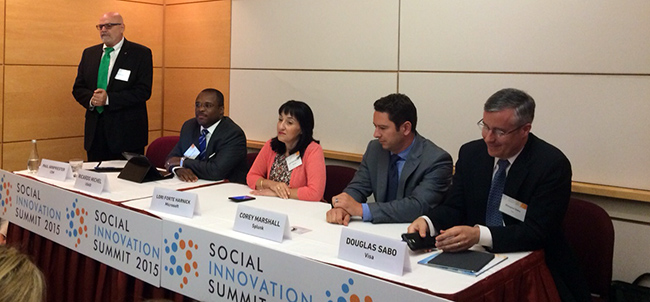SIS 2015: Companies Embracing Shared-Value Strategies
Corporate social responsibility is evolving.
A policy that was intended to balance a business’s impact on a community by doing good works has unearthed new business strategies. These discoveries have led to endeavors benefiting businesses as well as the citizens whose lives the companies touch, creating shared value.
On Wednesday, four experts on shared value gathered for the Tech for Good panel discussion at Social Innovation Summit 2015. Panel moderator Paul Arnpriester, national business development manager for CDW’s nonprofit team, opened by saying these stories help shed light on the human aspects of today’s business world.

The Tech for Good panel at SIS 2015 included (from left) Paul Arnpriester, Ricardo Michel, Lori Forte Harnick, Corey Marshall and Douglas Sabo.
Credit: D. Frank Smith
In 2013, Microsoft announced an initiative to help Africa's developer community expand its skills using Microsoft resources and software. Working with AfriLabs, the company helped develop sustainable working environments and grow fresh entrepreneurial enterprises across the continent.
"It is really about understanding what is the local need that is going to create the opportunity for society, as well as business, to build up the health of that community. And the more local the better," said Lori Forte Harnick, general manager of citizenship and public affairs at Microsoft.
Harnick said Microsoft expanded the skills of African developers partly because the company hopes to do business in the region.
“We’ve also invested in skilling people on the continent to become partners with us in developing home-grown opportunity,” she said.
Data-Powered Outreach
Corey Marshall oversees programs at Splunk4Good, the corporate social impact program for Splunk, a Big Data solutions provider. As part of its outreach efforts, Splunk has been applying data science for social good.
The company has given researchers at the Environmental Protection Agency a fresh look at the value of their sediment data through analytics, established a link between water distribution and drought, and given community volunteers data-powered insights into their own local campaigns.
“We’re helping people understand the value of data sets they might not otherwise realize,” Marshall said. “We are also trying to imagine what the new [data] applications are, so some of our paying customers can envision the realm of possibilities.”
Having data is valuable for ascertaining a campaign's success. But just having access to powerful metrics isn't enough today, Harnick said. Companies have to dig deep into the results, and sometimes that can be a harrowing task.
"You have to be willing to really examine the data and see what worked and didn't work," Harnick said. "That's where we have to push ourselves now."
Shared Value Brings Rivals Together
In exploring new avenues for shared-value proposals, companies sometimes find themselves standing shoulder to shoulder with their competition. But that's not necessarily a bad thing.
Douglas Sabo, head of global corporate philanthropy and responsibility at Visa, said he's seeing a rise in private–private partnerships, in which companies, instead of competing, work together on projects for mutually beneficial goals.
These partnerships, said Marshall, are one of the most important parts of the conversation in creating shared value today, because it's opening new, unprecedented alliances.
"Business interests and social impact interests aren't necessarily mutually exclusive," Marshall said. "It's a matter of peeling back the layers and discovering what's motivating each of them."
Explore all of BizTech's Social Innovation Summit 2015 coverage, including articles and video interviews with industry leaders, on our SIS landing page.









